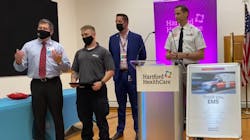CT Medics Honored for Saving Butcher from Near-Fatal Cut
By Taylor Hartz
Source The Day, New London, Conn.
SALEM, CT—As a butcher, Sean Kelley knows his cuts. And as soon as he saw the gash that tore through his colleague, he knew it wasn't good.
Adam Ritchotte, 28, was doing a task he'd done more times than he could count — cutting into a beef shoulder blade with a razor-sharp 6-inch knife at his job at Salem Prime Cuts — when suddenly, the knife slipped. It fell onto the table in front of him before bouncing back toward his body, slicing through his groin just below his right hip bone.
In the time it took for paramedics to arrive, Ritchotte "could've died three times over," his doctors said.
"We've all heard stories in this job about this kind of cut," Kelley said. "It's called the widow maker."
Knowing how to respond
As a combat veteran, Ritchotte knew how to respond. He needed to remain calm and stop the bleeding. Because of where the cut was located, a tourniquet wasn't an option. So, Ritchotte turned to Kelley for help, asking him to kneel on him as hard as he could until help arrived.
When ambulances arrived 12 minutes later, EMS worker Charles Weinsteiger, 22, thought he was walking into a routine call where someone sustained a cut and they'd get the person to the hospital. But he, too, recognized the severity of the injury right away.
Weinsteiger, an active member of the U.S. National Guard, also immediately turned to his trauma and combat training.
"I put all my fancy gear down and I walked over and just stuck my hand in his leg," he said. "I started packing it with gauze and just kept packing and packing — I think I went through 12 rolls of gauze. When we got to the hospital, I jumped up on the stretcher and kept my hand there until he went into surgery."
The wound severed Ritchotte's right femoral artery. "Usually a person bleeds to death in three minutes," said Kyle McClaine, medical director for Backus Hospital. "Adam would've been dead three times over if it weren't for Sean (Kelley)."
Kelley, who knelt on his friend to apply pressure to the wound for nearly 12 minutes, said he knew right away the injury was likely fatal.
"The possibility hit me immediately," said the butcher, who could tell by both the color and sheer volume of blood that the cut had sliced an artery. "It's our job to kill things by exsanguination (draining of blood), so I could tell how bad it was."
Ritchotte, of Baltic, who toured Afghanistan as a U.S. Army soldier in 2013, said his military training helped him "100%" in the minutes immediately following the cut.
"I knew I had two choices: I was either going to die calm or die freaking out," he said. Staying calm, he thinks, is what ultimately helped him survive.
Awards presented
Hartford Healthcare on Thursday recognized all those who worked together to save Ritchotte's life in March, as well as promoting its "stop the bleed" initiative to educate people on lifesaving measures as part of National EMS week.
The health care network gave awards to eight emergency medical responders and firefighters — Deborah Caldwell, Patrick Gauthier, Alex Bias, Ben Mattingly, Stephanie Philopena, Cheryl Philopena and Ronald Prezsch — for going above and beyond the typical call of duty. It was the first time the award had been presented in the Eastern Connecticut region.
Doctors Edward D. Gifford, co-director of the East Region Limb Preservation Program, McClaine and Kevin Ferrarotti, Hartford HealthCare EMS System Director, all attended a ceremony at Gardner Lake Volunteer Company Station 27 firehouse on Thursday. They recalled the procedures that kept Ritchotte alive and said the initial efforts by Kelley and Weinsteiger saved Ritchotte's life and leg.
Some of the first responders also led attendees in a demonstration on how to stop bleeding, and Hartford Healthcare provided Ritchotte with a "stop the bleeding" kit to keep at the butcher shop.
Though Ritchotte has not yet returned to work, he said his doctors don't think he will require any additional surgeries or physical therapy. He was unable to walk for a little over a month, but is now back on his feet and feeling thankful to be alive, he said.
Kelley said that in addition to being thankful that Ritchotte is alive and walking, he and his colleagues at Salem Prime Cuts also learned the utmost importance of wearing proper personal protective equipment at all times. He said he will never work again, or allow any of his colleagues to work or train, without wearing a chain link apron to protect them from the knives they wield. Prior to this incident, they didn't even own the protective equipment, he said.
He said he also wants to learn about any medical conditions his colleagues might have, like diabetes, so that he can be prepared to help in event of another emergency.
"I want to do everything I can to avoid something like this from happening," he said.
Kelley also expressed his gratitude for all the health care workers who helped his friend. "Thanks for saving my friend's life," he said to the doctors and first responders who took over the life-saving measures that day. "This could have had a much different ending."
Cheryl and Stephanie Philopena, two of the emergency medical responders who helped Ritchotte, said that "the rescue started with Sean."
"If he hadn't done what he did, we wouldn't have had anything to work with," Cheryl Philopena said.
___
(c)2021 The Day (New London, Conn.)
Visit The Day (New London, Conn.) at www.theday.com
Distributed by Tribune Content Agency, LLC.






